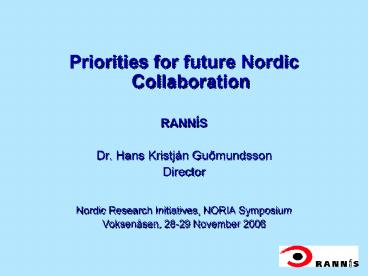Priorities for future Nordic Collaboration - PowerPoint PPT Presentation
1 / 9
Title:
Priorities for future Nordic Collaboration
Description:
Science and Technology Policy Council (Five ministers and 14 members from ministries, ... Geosciences Vulcanology, Glaciology, Paleoclimate, ... – PowerPoint PPT presentation
Number of Views:23
Avg rating:3.0/5.0
Title: Priorities for future Nordic Collaboration
1
- Priorities for future Nordic Collaboration
- RANNÍS
- Dr. Hans Kristján Guðmundsson
- Director
- Nordic Research Initiatives, NORIA Symposium
- Voksenåsen, 28-29 November 2006
2
The Public RD Governance Structure in Iceland
PARLIAMENT
GOVERNMENT
Science and Technology Policy Council
(Five ministers and 14 members from ministries,
research community and industry - PM Chair)
Ministry of Education, Science and Culture
Ministry of Industry and Commerce
Science Board
Technology Board
Technology Development Fund
Research Fund
Technology Development Fund
Fund for Research Equipment
The Icelandic Centre for Research
Fund for Research Training
International Cooperation
Analysis, Evaluation Indicators
Nanoscience/Postgenomics
3
Science and Technology Policy 2006-2009
- A society at the forefront among nations...
- Strategic priorities
- Establish an internationally outstanding
educational and scientific institutional system
closely connected to a dynamic economy, capable
of providing leadership in responding to rapid
changes. - Strengthen public competitive funding schemes and
merge these in related areas - Encourage private firms and the public sector
institutions to join efforts in strengthening
research and development in order to boost
successful and profitable innovation and thus
international competitiveness based on knowledge - Redefine the role of the public sector in
financially supporting scientific monitoring and
research in support of public interest,
environmental protection and sustainable economic
growth.
4
Strengthening International Cooperation
- Participation in international science and
technology cooperation be further strengthened as
a part of the globalising strategy of the
Icelandic science and business community. - The outcome and benefits gained so far from the
participationin international cooperation be
evaluated and the strategic priorities made
accordingly. - Support be given to enhanced efforts in Nordic
Science and Technology cooperation and in the EU
7th Framework Programme... - Cooperation with the Arctic Council member
states, the USA and Asian countries be
strengthened. - Financial resources be ensured for allocations to
common programmed funds in those areas where
Icelandic participation appears particularly
appropriate and where international peer review
panels evaluate thre applications in
competitions. - The leadership by Icelandic scientists be
encouraged in international cooperation projects
where Icelandic competence is at the forefront...
5
Research in the public interest
- Society and Ethical values
- ... encourage innovations based on research in
the humanities and social sciences ...stimulate
active debate on ethical values...the legal
framework for scientific ethics ... be reviewed - Monitoring the environment and sustainable use of
natural resources - ...comprehensive overview of databases ... need
to be built up continuously ... preserved and
made accessible...a plan for environmental
monitoring ... - Efforts should be made to increase international
cooperation in these fields. - Health and Nutrition
- Innovation in the health sector based on
biomedical research ... Use of biobanks and
patient records for research ... Public debate on
policy ... - Increasing food security ...
- Increased research efforts on factors that are
decisive for healthy food and lifestyles
6
Maintaining international competitiveness
- The extreme mobility of Icelandic researchers and
research students and not the least their
willingness to return with knowledge and skills
gained abroad, combined with an seemingly
inherent entrepreneurial spirit, has created a
unique capacity in a small society. - High quality research environments, have emerged
with a need for the workforce of students and
high potential to give doctoral students support
of the quality needed for an internationally
recognised PhD - However, the research groups are small. Facing
the present rapid growth of registered doctoral
students at home, we have to assure the quality
of the doctoral education offered to be able to
maintain and enhance the potential for research
and innovation. - The answer will partly be home based
internationalisation creating and participating
in international multi- or binational graduate
school programmes, agreements with foreign
universities on joint programmes and joint
degrees are the key to continued success with
priority given to our strongest fields.
7
Fields of strength
- Health sciences, Biotechnology, Genomics,...
- Geosciences Vulcanology, Glaciology,
Paleoclimate,.. - Energy Water management, Geothermal, deep
drilling new science/new technology - Hydrogen - The earth system in the North Atlantic ocean,
climate, biosystems, resources,... - Norden in the middle ages the formation of
nations,... - Nanotechnology competence building
- ...
8
Can we tap into deeper geostructures?
9
How can we make NORIA work
- Individual researchers, institutions, companies
need an encouraging and rewarding framework /
structure a visible added value - Strategic choices of fields chosen on the basis
of Nordic added value a bottom up process as
far as possible. - Focus on common pots supporting research but
continue the seed funding of cooperation costs.
More central Nordic funds - Couple strongly the NCM institutions for the
promotion of reseach and innovation - Focus on virtual structures for diversity of
environments - Focus on young researcher to make NORIA
sustainable - Simplify the flora of nordic organisations /
committees as far as possible - Continue the NORIA symposia for exchange of
information - focus? - Create a contact forum for NCPs to the EU
Framework - Foster the Nordic interests and cooperation
through ERA nets - NORIA - a strong home base for researchers in
Norden































